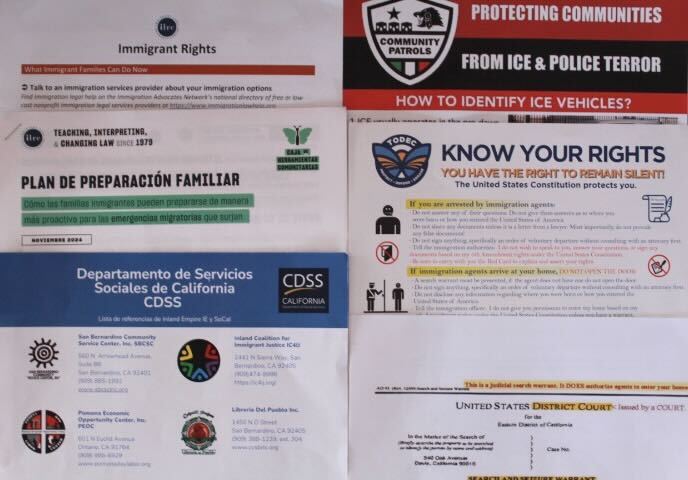
Marissa Perez
Volantes y paquetes que informan a las personas sobre los derechos de inmigración y los recursos locales proporcionados por La Casa Engagement Center.
Since June 6, Immigration and Customs Enforcement has triggered fear among immigrants through its enforcement tactics by detaining people and raiding local businesses. These events led to Riverside City College’s La Casa Engagement Center, a Latinx-focused support program, to host an informal group therapy session for the college community June 10.
The center invited Jacqueline Garcia, a clinical therapist who works with Latino families, to lead the discussion. For an hour, she worked with students and faculty to process their anxiety, anger and heartache due to feelings of helplessness in their community.
“I hope the students and staff felt seen and supported during the event,” Garcia said via email. “The event not only brought the community together, but it also fostered a sense of human connection that is crucial as we navigate these challenging times. The full room of participants was a testament to their resilience and determination to work towards meaningful change.”
The next day, the Riverside Community College District also sent out a message warning students that immigration enforcement agents are active in Riverside County.
The center also shared numerous informational pamphlets about local resources to help prepare families, guide people through precautionary steps and highlight the importance of mental health.
Viewpoints has summarized the resources provided by the La Casa Engagement Center below.
Legal advice and resources:
The Immigration Legal Resource Center (ILRC) and Gen Z For Change created a flyer that breaks down five legal rights a person has when confronted by an immigration agent.
The organization acknowledged that a person has the right to remain silent during an immigration stop. The ILRC states that the right to remain silent is a powerful right under the U.S Constitution. ICE may use tactics to get an individual to incriminate themselves. However, the organization suggests not answering their questions.
“Remain silent and answer none of their questions until you speak with a lawyer if you are detained,” the ILRC wrote in the pamphlet. “Especially about your birthplace, immigration status or how you entered the United States.”
The ILRC also states that a person has the right to be protected from unwanted searches. A person has the right to demand a judicial warrant before letting ICE into their house. The ILRC also states that an ICE warrant is not a judicial warrant. If ICE claims they have a warrant, do not open the door. They added that it is important to be educated on what a proper warrant looks like.
The pamphlet also recommends not to not run away from immigration agents.
“If ICE approaches you on the street, do not run away, as this can be a reason for ICE to arrest you,” the pamphlet said.
They also suggest speaking with a lawyer if arrested.
ILRC created another packet, a Step-by-Step Family Preparedness Plan that encourages families to plan ahead and provides tips on how to be prepared. The first factor is to make a child care plan.
“It is important to have a plan so that a trusted adult can care for your child if you cannot,” the ILRC wrote “This plan should include emergency numbers and a file with important documents.”
They recommend that it is important to carry any legal documents.
“Carry a valid work permit or green card, if you have one,” the ILRC stated. “If you do not have one, generally it is advisable to carry a municipal ID, state ID or driver’s license if it was issued in the United States and contains no information at all about your immigration status or your country of origin.”
Another flyer from the Inland Empire’s Centro Del Inmigrante, or Immigrant Center in English, highlighted some nonprofit immigration-related resource centers throughout the Inland Empire.
Listed below is the information for some of those nonprofits.
Inland Coalition for Immigrant Justice
2441 N Sierra Way, San Bernardino, CA 92405
(909)- 474- 9996
Immigrant Defenders Law Center
3600 Lime St., Suite 442, Riverside CA 92501
(213) 634- 0999
Training Occupational Development Educating Communities Legal Center TODEC
234 South D Street, Perris CA, 92570
(951) 943- 1955
1482 Sixth Street, Coachella, CA 92236
(760) 698- 8787
Psychological Destresser Methods:
During the student check-in, Garcia guided the attendees through a mindful exercise called RAIN. Here, participants breathe in through their nose and exhale through their mouths to release stress and follow the process of RAIN.
The acronym stands for,
Recognize: Getting in touch with your emotions and feelings, allowing yourself to feel at ease.
Allow: Observing your emotions and acknowledging the way you feel.
Investigate: What emotions are you feeling?
Nurture: Give yourself comforting messages, as well as looking for emotional support in others
Garcia also shared a dialectical behavior therapy distress tolerance skill called TIPP. Garcia also advised attendees to follow this skill.
The acronym follows,
Temperature: Cooling the body can shift attention from intense thoughts. Suggest taking a cold shower or applying an ice pack to your skin.
Intensive Exercise: Intense exercise lowers stress levels, try going on a walk or riding a bike.
Paced breathing: Paced breathing helps decrease stress.
Progress muscle: Relaxing the body helps lower stress.
Both exercises are provided by TherapistAid.com
Other Information:
A flyer from Union del Barrio shares that ICE is operating in non-CA-exempt cars. The cars are from the following models: Ford Explorer, Dodge Durango and Chevy Tahoe.
An article from KTLA5 lists Southern California Rapid Response Networks for each county,
San Bernardino/ Riverside: (909)-361-4588
Los Angeles: (888)-624-4752